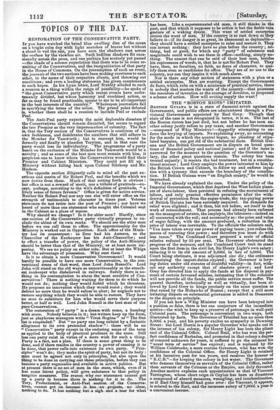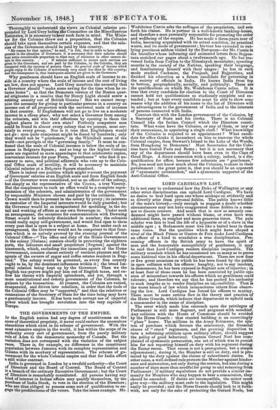THE "BOSTON RIOTS" IMITATED.
BRITISH GUIANA is in a state of financial revolt against the Government, and public affairs are administered through a Pro-
visional Government appointed by Earl Grey. Though that state of the case is not recognized in terms, it is so. The last of the Boston rioters has just died, but not before lie has seen an- other colony justly refuse to pay taxes, and another Government —composed of Whig Ministers l—doggedly attempting to en- force the levying of imposts. No explaining away, no accounting for the mode in which the quarrel began, no pleading of stipu- lated bargains, can get rid of the substantial facts. British Gui- ana and the British Government are in dispute on broad ques- tions of financial policy and national justice ; and if the issue is narrowed for the moment to the question of the Governor's sa- lary, the other great questions remain. The colony has been treated unjustly ; it resents the bad treatment, but in a constitu- tional manner ; Lord Grey employs the power intrusted to him by the British Crown and Cabinet, to follow up and enforce injus- tice with a tyranny that exceeds the boundary of the constitu- tion. If British Guiana were "an English county," he would be impeached.
We have already explained the case. Under the policy of the Imperial Government, which first deprived the West Indian plant- ers of slave-labour, then persisted in refusing the recruitment of labour, and only granted effective permission after the with- drawal of protection from the sugar-trade, the tax-paying power of British Guiana has been seriously impaired. Its demands for relief were slighted ; and it then, but not before, set itself to the work of retrenchment. That process had already been enforced on the managers of estates, the employes, the labourers—indeed on all connected with the soil; and necessarily so : the price and value of sugar falling, with the amount produced, a reduction in the price of labour was inevitable. To the officials the colonists said, "You have taken away our power of paying taxes ; you refuse the means of restoring that power ; and therefore you must do with less taxes." The Combined Court proposed a scale of official salaries reduced by 25 per cent. The Governor obstructed the progress of the measure, and the Combined Court took its stand upon the first item in the civil list, Sir Henry Light's own salary; reducing it to its old amount of 3,300/. in lieu of 5,000/. The Court being obstinate, it was adjourned sine die ; the ordinance authorizing the import-duties expired ; the Governor is levy- ing duties under old statutes of doubtful validity—in fact, with- out any authority except that of absolute power ; and Lord Grey has directed him to apply the funds at his disposal in pay- ment of certain favoured salaries, intimating that if the colonists will not provide all the funds, the public service must suffer. The quarrel therefore, technically as well as virtually, has been al- lowed by Lord Grey to hinge precisely on the same question as that raised by the Mohawks of Boston ; except that a still more irritating dispute on substantial grievances is added in Demerara to the dispute on principle.
If you ask how a Whig Minister can have been betrayed into a position so false, there is but one conjecture of the immediate motive—the wish to keep up a preserve of patronage in well-paid Colonial posts. The patronage is convenient in two ways, both illustrated by facts. The Governor of Trinidad has no more than 3,500/. a year, and his poverty excites no sympathy in Downing Street : but Lord Harris is a popular Governor who speaks out in the interest of his colony, Sir Henry Light has been the pliant tool of the Colonial Office. Colonel Reid, who has won the per- fect confidence of Barbados, and promoted in that colony a degree of concord unknown for years, is suffered to go the moment his "usual term of service" has expired ; and is replaced by Sir
William Colebrooke, a mere routine Governor, who has won the confidence of the Colonial Office. Sir Henry Light is retained
at his lucrative post for ten years, and receives the honour of " K.C.B."—for keeping the colony in hot water. The Governors who demean themselves as servants of the Colonial Office, rather than servants of the Colonies or the Empire, are duly favoured. Another motive explains such appointments as that of Viscount Torrington, whose short reign in Ceylon has been as disastrous a compound of absurd measures, wrangling, and insubordination, as if Earl Grey himself had gone over : the Viscount, it appears, is related to the Earl, and the immense salary of 7,000/. a year is a convenient income. Thoroughly to understand the views on Colonial salaries pro- pounded by Lord Grey befoe the Committee on the Miscellaneous Estimates, it is necessary to bear such facts in mind. The Minis- ter for the Colonies threw out a proposition, that the Colonies should take upon themselves certain expenses, and that the sala- ries of the Governors should be paid by this country.
"My reason for that opinion," he said, "is this, that in order to have efficient persons in the situation of Governors, it is necessary that their salaries should bear some considerable proportion to what men of eminence in other careers ob- tain in this country. . . . If salaries sufficient to secure such services are given to the Governors, and are paid by the Colonies, in the Colonies, they are compared with the incomes of persons there: the general scale of income which people enjoy in the Colonies is notoriously very much less than in this country; and the consequence is, that inadequate salaries are given to the Governors."
Why gentlemen should have an English scale of income to re- side in a country where the scale of income and the cost of living are low, does not appear. Lord Grey mentions the necessity that a Governor should make some saving for the time when he re- turns home"; so that the Demerara version of the Boston quar- rel originates in a resolve that Sir Henry Light should screw a retiring annuity out of British Guiana! But we cannot recog- nize the necessity for giving to particular persons in a country an income out of all proportion with the universal scale of incomes in that country. If Englishmen will not go to live on a moderate income in a cheap_ place, why not select a Governor from among the colonists, and win their affections by opening to them the highest places in their own state ? Perfectly competent men could be found in almost every colony that we possess, most cer- tainly in every group. Nor is it true that Englishmen would not go : men quite competent might be found by hundreds ; only they would not be "gentlemen," in the Whitehall sense of the word—not proteges of the "governing family." It must be con- fessed that the scale of Colonial incomes is below the scale of in- comes in Belgrave Square; and so long as the higher Colonial posts are regarded as mere appendages to that aristocratic region, convenient retreats for poor Peers, " gentlemen " who find it ne- cessary to save, and political adherents who vote up to the Colo- nial Office mark of servility, it will be necessary to maintain Colonial salaries at a Belgrave Square standard. There is indeed one position which might warrant the payment of Governors' salaries at an English scale and from English funds —if the Governor were considered, not as an officer of the colony, but simply as the representative of the Crown, a true Viceroy. But the complement to such an office would be a complete repre- sentation of the colonists, and administration of the government by responsible Ministers chosen and paid by the colonists. The Crown would then be present in the colony by proxy ; its interests as custodier of the Imperial interests would be duly guarded ; but the Governor would be as incapacitated for meddling in the de- tail and working of affairs as our own Sovereign is. Under such an arrangement, the occasions for communication with Downing Street would be infinitely diminished in number; the colonists would really enjoy self-government, and would find open to them every post that is open to a subject at home. But under such an arrangement, the Governor would not be competent to that func- tion which is so naively avowed by the evening journal of the Colonial Office—" The office and duty of the Home Government in the colony [Guiana] consists chiefly in protecting the eighteen parts, the labourers and small proprietors [Negroes] against the nineteenth, which, excluding the immediate agents of the Home Government, consists almost entirely of resident planters and the agents of the owners of sugar and coffee estates resident in Eng- land." The colony would be governed, as every free country ought to be, by the dominant influences within it ; the broad Im- perial relation being kept up by the Governor. Then we the English tax-payers might pay him out of English taxes, and en- dow his throne with Imperial splendours, and yet, through a more constitutional and orderly government of the Colonies, be gainers by the transaction. At present, the Colonies are ruined, exasperated, and driven into rebellion, in order that the tools of the Colonial Office may be "supported," and that the relatives or connexions of the Secretary of State for the time being may have a gentlemanly income. It has been such corrupt use of imperial power which has brought revolution into the very capitals of Europe.



























 Previous page
Previous page